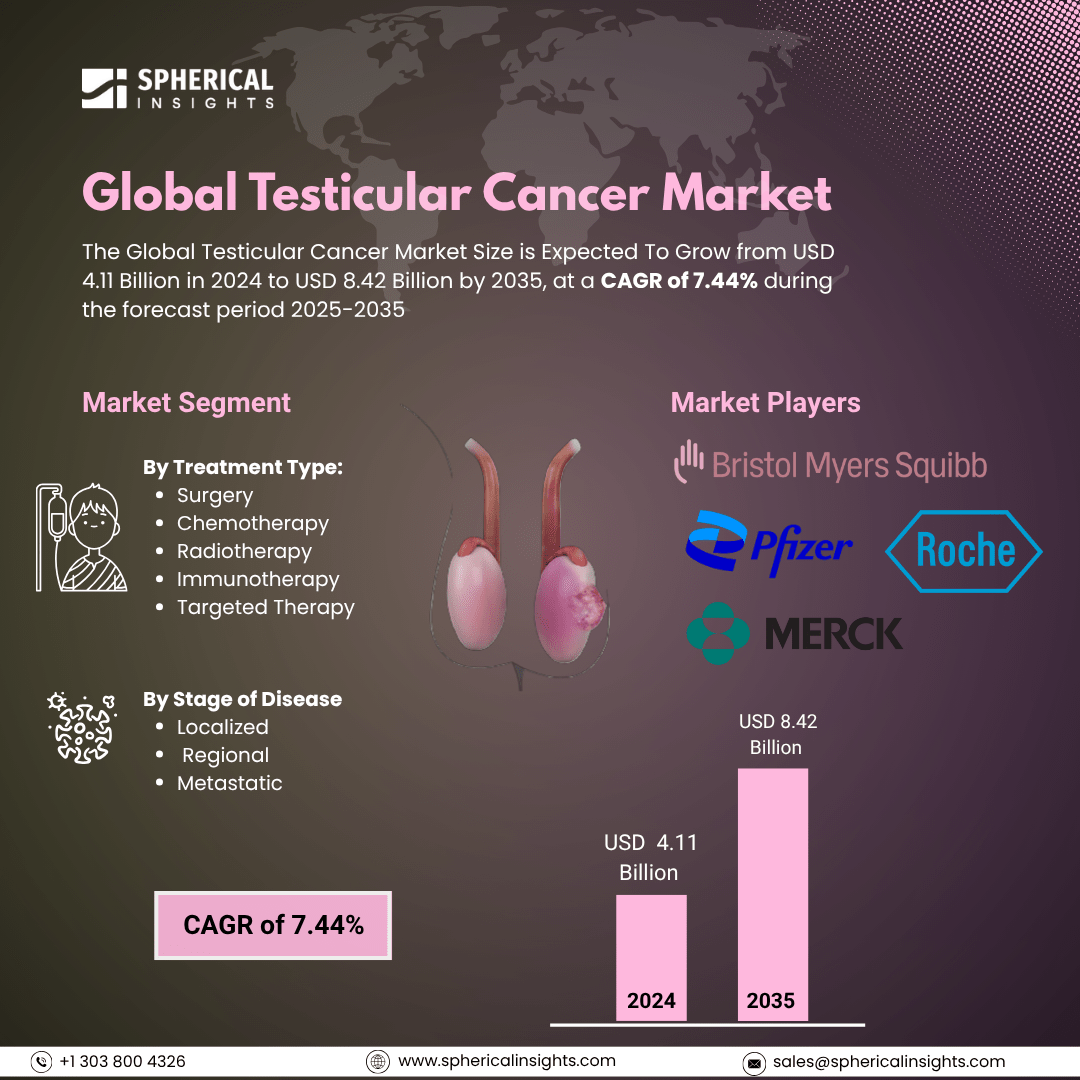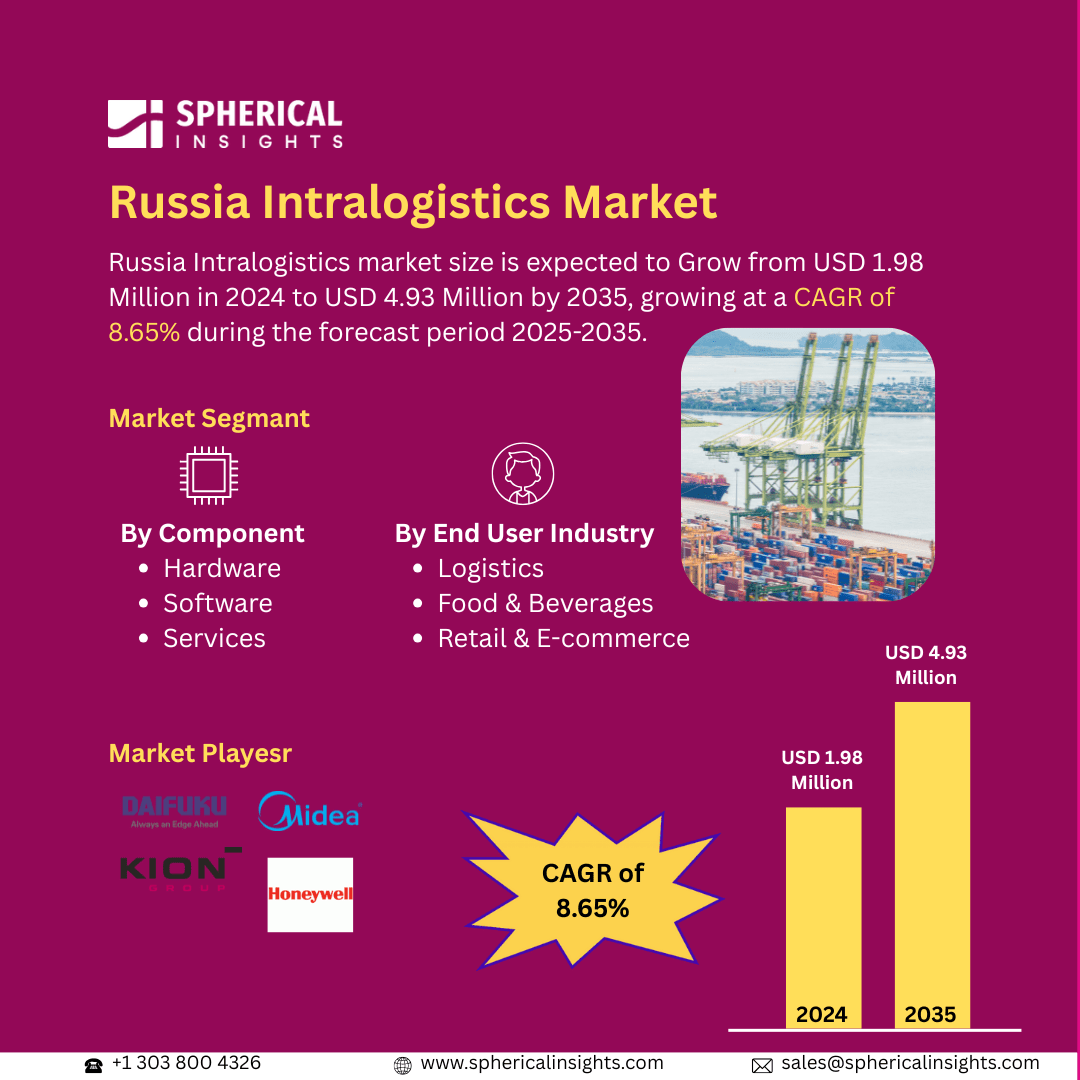- As per Spherical Insights & Consulting, The Global Testicular Cancer Market Size is expected To Grow from USD 4.11 Billion in 2024 to USD 8.42 Billion by 2035, at a CAGR of 7.44% during the forecast period 2025-2035, owing to the launch of new therapies in the market and the rise in the number of cases.
- The leading Testicular Cancer Market Companies such as Bristol-Myers Squibb, Pfizer, Roche, Merck & Co., Novartis, Sanofi, AstraZeneca, Eli Lilly, Bayer, Teva, Johnson & Johnson, Fresenius Kabi, Amgen, Takeda, Ipsen, and Others.
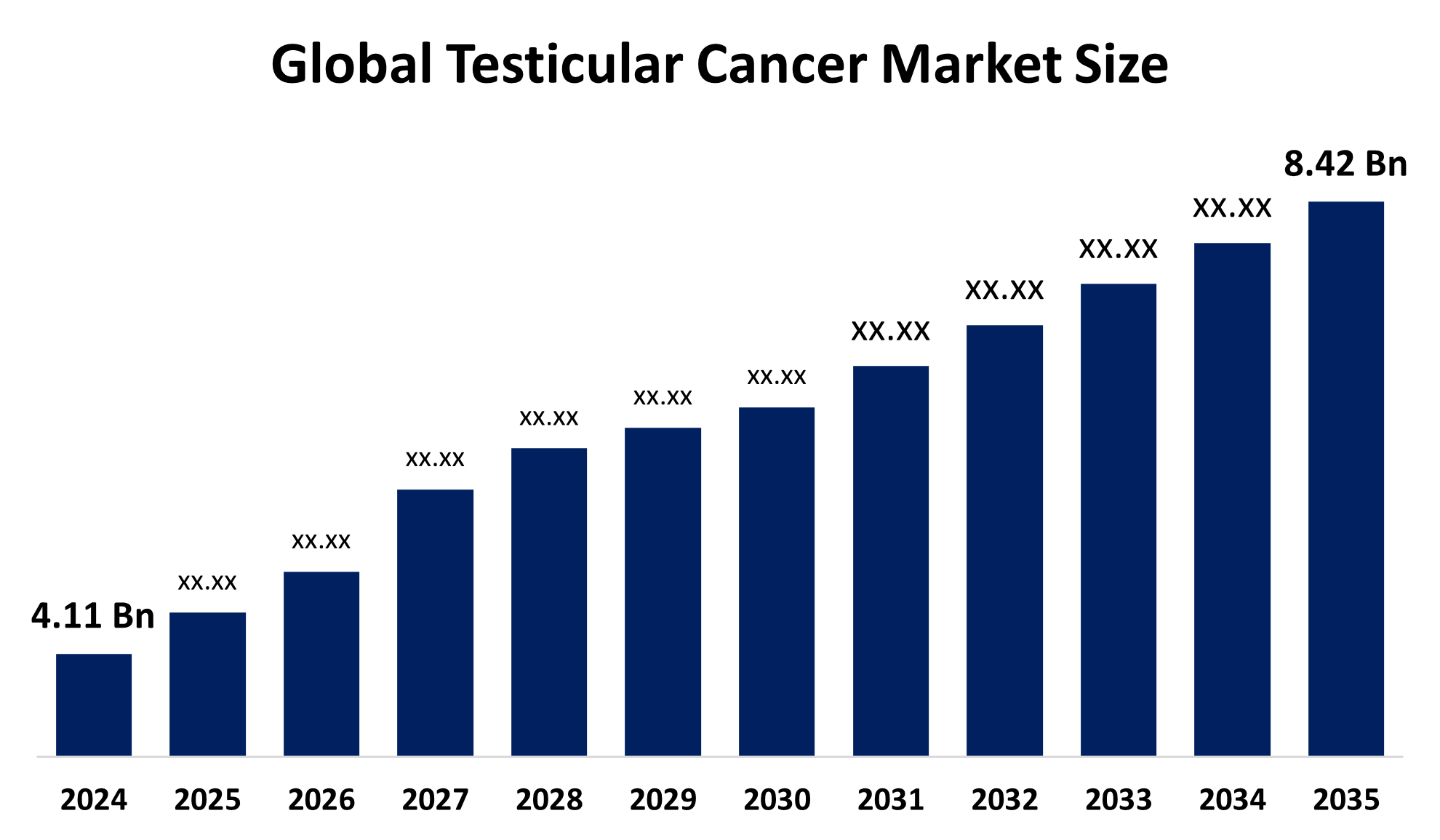
Testicular Cancer Treatment Market: Understanding and Treatment Algorithm:
Testicular cancer is a type of cancer that forms in the testicles, the male reproductive glands. It commonly affects younger men, typically between the ages of 15 and 35. Symptoms include a lump, swelling, or pain in the testicle. It’s highly treatable, especially when detected early, with options like surgery, chemotherapy, and radiation therapy available.
Testicular Cancer Diagnosis:
Diagnosis of testicular cancer involves a physical exam to check for lumps or swelling, followed by ultrasound imaging of the scrotum. Blood tests are done to detect tumor markers like AFP, hCG, and LDH. If cancer is suspected, the affected testicle may be surgically removed and examined to confirm the diagnosis and determine the type.
Testicular Cancer Treatment
Testicular cancer treatment depends on the type and stage of the cancer. Common options include surgery (orchiectomy) to remove the affected testicle, followed by chemotherapy or radiation therapy to eliminate remaining cancer cells. Surveillance may be used for early-stage cases. Advanced stages might require additional surgeries or high-dose chemotherapy with stem cell transplant in rare cases.
Testicular Cancer Epidemiology
The disease epidemiology covered in the report provides historical as well as forecasted epidemiology segmented by Total Diagnosed Incident Population of Testicular Cancer, Gender-specific Diagnosed Incidence of Testicular Cancer, Type-specific Diagnosed Incidence of Testicular Cancer, Age-specific Diagnosed Incidence of Testicular Cancer, Diagnosed Incident Population based on Primary Site of Testicular Cancer, and Diagnosed Incident Population based on Histologic Classification of Testicular Cancer Tumour in the global market covering North America, Europe, Asia-Pacific, Latin America, the Middle East, and Africa from 2024 to 2035.
Principal Insights
This section offers a global overview of testicular cancer epidemiology in major markets worldwide.
Country Wise- Testicular Cancer Multiforme Epidemiology
- The epidemiology segment provides Testicular Cancer prevalence data and findings across key regions worldwide, including North America, Europe (Germany, France, Italy, Spain, and the United Kingdom), Asia-Pacific (including Japan), Latin America, the Middle East, and Africa.
Testicular Cancer Recent Developments:
- In October 2023, BioNTech SE (Nasdaq: BNTX, “BioNTech” or “the Company”) announced follow-up data from its ongoing first-in-human Phase 1/2 trial (NCT04503278; 2019-004323-20) that evaluated the safety and efficacy of the Company’s Claudin-6 (CLDN6)-directed CAR-T cell therapy candidate BNT211 in patients with CLDN6-positive refractory/relapsed solid tumours.
Testicular Cancer Marketed Drugs:
- Opdivo: Bristol-Myers Squibb
Opdivo (nivolumab) is an anti-PD-1 immune checkpoint inhibitor that boosts the immune response to fight cancer. It is FDA-approved for several cancers and is in clinical trials for testicular cancer.
Bavencio (avelumab) is an anti-PD-L1 monoclonal antibody that blocks the PD-L1 protein, helping restore immune system activity against cancer cells. It is approved for various cancers and is being investigated in testicular cancer.
Jevtana (cabazitaxel) is a chemotherapy drug that inhibits microtubule depolymerization, leading to cancer cell death. It is FDA-approved for advanced testicular cancer, especially after failure of platinum-based chemotherapy.
Testicular Cancer: Emerging Therapies
- BNT327: BNT327 is a bispecific antibody in late-stage trials for testicular cancer. It targets two immune checkpoints to enhance T-cell activation and tumor response, aiming to improve outcomes in patients resistant to standard PD-1/PD-L1 therapies.
- BNT211: BNT211 is a CAR-T cell therapy targeting Claudin-6 (CLDN6), a protein expressed in testicular germ cell tumors. It combines CAR-T cells with a CARVac vaccine to boost immune response and has shown promising results in early-phase clinical trials.
- SGN-ALPV: SGN-ALPV is an antibody-drug conjugate designed to deliver cytotoxic agents directly to testicular cancer cells expressing specific antigens. It is currently in Phase 1 clinical trials to evaluate safety and efficacy.
- Cabazitaxel (Jevtana)-New Formulation: An optimized formulation of cabazitaxel is under investigation to improve delivery and reduce side effects in patients with resistant or advanced testicular cancer.
Testicular Cancer Market Outlook
- The testicular cancer market comprises the development, production, and sales of drugs and therapies used to diagnose, treat, and manage testicular cancer. It includes chemotherapy, immunotherapy, targeted therapy, and supportive care, driven by increasing incidence, advanced treatments, and growing awareness globally.
- Key drivers of the testicular cancer market include rising incidence rates, advancements in targeted therapies and immunotherapies, increased awareness and early diagnosis, growing healthcare infrastructure, and government support for cancer research and treatment initiatives worldwide.
- Market opportunities in testicular cancer include expanding immunotherapy and CAR-T cell treatments, emerging targeted therapies, unmet needs in resistant or relapsed cases, growing investment in research and development, expanding healthcare access in developing regions, and personalized medicine advancements enhancing treatment efficacy.
- Governments support testicular cancer through early detection programs, funding research, expanding healthcare access, offering insurance coverage, and establishing specialized cancer centers to improve diagnosis, treatment, and patient outcomes worldwide.
- Challenges include late diagnosis, limited awareness, drug resistance, high treatment costs, and inadequate healthcare infrastructure in some regions.
- The testicular cancer market is projected to grow steadily due to rising incidence, advances in targeted therapies, and increased healthcare investments globally.
Testicular Cancer Market Segmentation
By Treatment Type:
- Surgery
- Chemotherapy
- Radiotherapy
- Immunotherapy
- Targeted Therapy
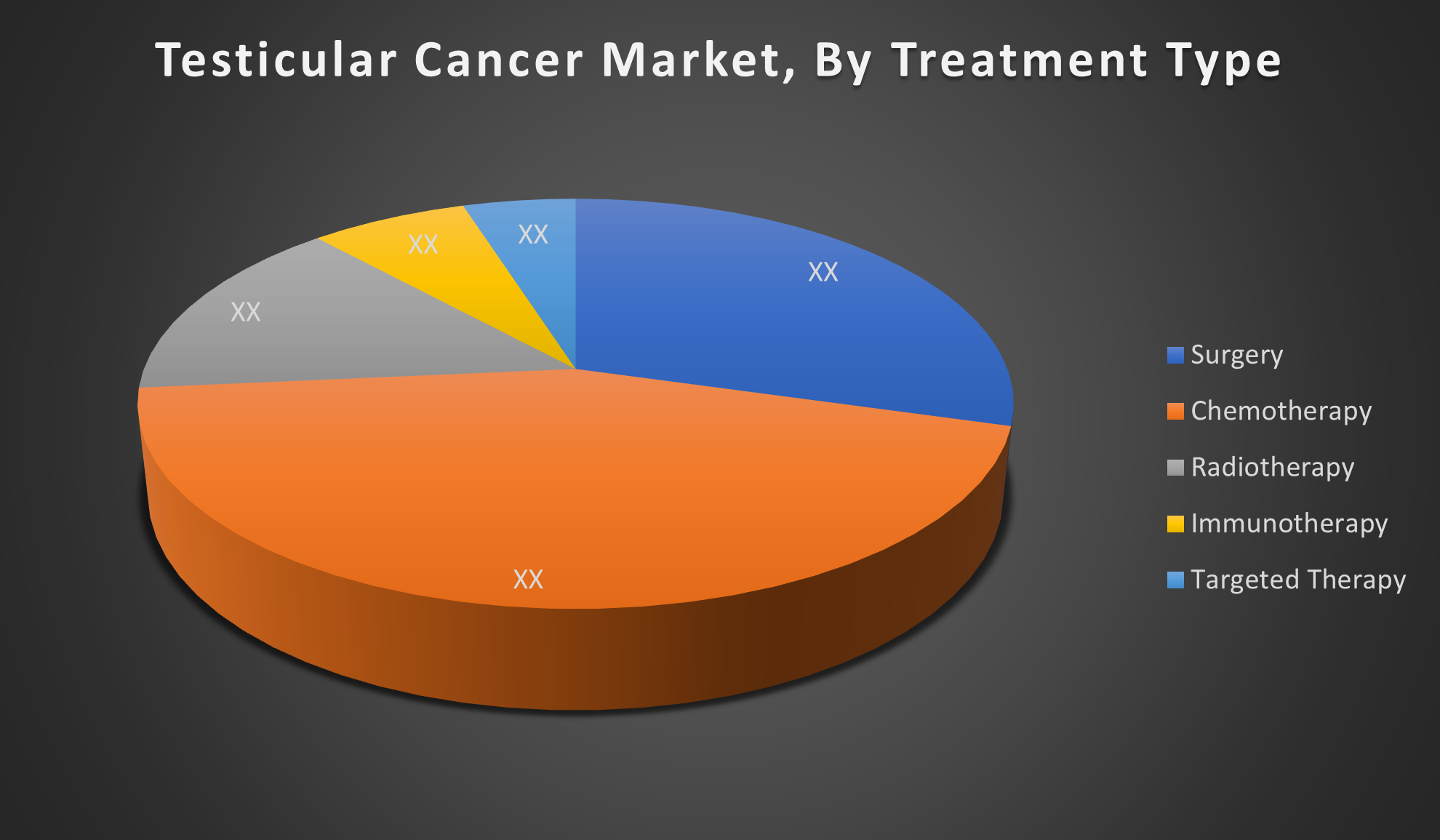
The Chemotherapy segment dominates the testicular cancer market due to its proven effectiveness in treating most testicular cancer types, especially with platinum-based regimens. It offers high cure rates, wide availability, and established treatment protocols, making it the preferred and standard therapy worldwide.
By Stage of Disease
- Localized
- Regional
- Metastatic
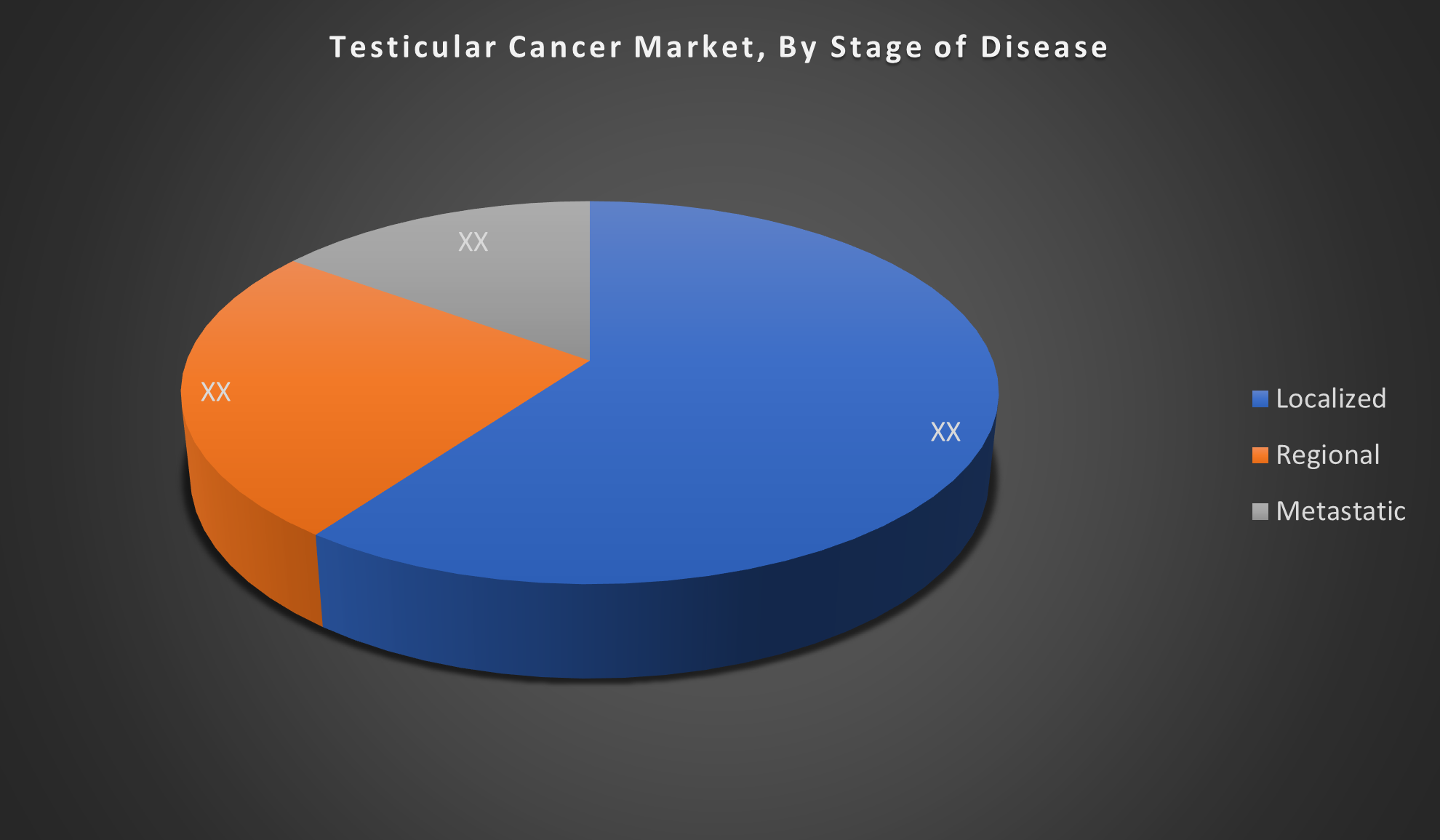
The Localized stage segment dominates the testicular cancer market because early detection allows for effective treatment with higher survival rates. Patients diagnosed at this stage often require less aggressive therapy, leading to better outcomes and lower treatment complexity compared to regional or metastatic stages.
Regional Segment Analysis of the Testicular Cancer Market
North America dominates the testicular cancer market, accounting for the largest share due to its well-established healthcare infrastructure, high patient awareness, and strong presence of key pharmaceutical companies. Additionally, extensive government funding, advanced research activities, and widespread adoption of innovative therapies contribute to market leadership. The region’s robust insurance coverage and early diagnosis programs further support market growth.
The Asia-Pacific region is the fastest-growing market, fueled by increasing cancer incidence, expanding healthcare infrastructure, and rising awareness about testicular cancer. Rapid urbanization, improving access to advanced diagnostic and treatment facilities, and growing government initiatives to enhance cancer care are accelerating growth. Additionally, increasing investment by global pharmaceutical companies and a large patient pool offer significant growth opportunities in this region.
Testicular Cancer Market Key Companies
- Bristol-Myers Squibb
- Pfizer
- Roche
- Merck & Co.
- Novartis
- Sanofi
- AstraZeneca
- Eli Lilly
- Bayer
- Teva
- Johnson & Johnson
- Fresenius Kabi
- Amgen
- Takeda
- Ipsen
- Others
Testicular Cancer Therapeutics Market Report Scope
- The Testicular Cancer therapeutics market report provides a detailed overview, covering its causes, symptoms, disease progression, and existing treatment options.
- Detailed insights into Testicular Cancer’s epidemiology and therapeutic approaches are included.
- Additionally, a comprehensive review of existing and emerging Testicular Cancer therapies is provided, including an evaluation of new treatments expected to influence the current Testicular Cancer treatment market landscape.
- The report includes a detailed review of the Testicular Cancer therapeutics market, both historical and forecasted, highlighting the global drug reach.
- The Patient-Based Testicular Cancer Market Forecasting report offers valuable insights into trends shaping the global Testicular Cancer market, helping to develop effective business strategies.
Testicular Cancer Treatment Market Report Insights
- Forecasting Market Trends Based on Patient Data and Disease Rates
- Testicular Cancer Therapeutic Approaches in Testicular Cancer
- Review Of Drugs in Development for Testicular Cancer
- Market, Growth, and Trends in Testicular Cancer
- Market Opportunities in Testicular Cancer Treatment
- Effects Of Future Therapies on Testicular Cancer Treatment.
Testicular Cancer Treatment Market Report Key Strengths
- 15 Years Testicular Cancer Market Forecast
- Global Coverage
- Testicular Cancer Epidemiology Segmentation
- Key Cross Competition
Testicular Cancer Treatment Market Report Assessment
- Present Practices in the Testicular Cancer Treatment Market
- Review of Investigational Testicular Cancer Drugs
- Attractiveness of the Testicular Cancer Drug Market
- Testicular Cancer Market Drivers
- Testicular Cancer Market Barriers
- SWOT
- Attribute Analysis
Market Segment
This study forecasts revenue at the global, regional, and country levels from 2020 to 2035. Spherical Insights has segmented the testicular cancer market based on the below-mentioned segments:
Global Testicular Cancer Market, By Treatment Type
- Surgery
- Chemotherapy
- Radiotherapy
- Immunotherapy
- Targeted Therapy
Global Testicular Cancer Market, By Stage of Disease
- Localized
- Regional
- Metastatic
Global Testicular Cancer Market, By Regional Analysis
- North America
- Europe
- Germany
- UK
- France
- Italy
- Spain
- Russia
- Rest of Europe
- Asia Pacific
- China
- Japan
- India
- South Korea
- Australia
- Rest of Asia Pacific
- South America
- Brazil
- Argentina
- Rest of South America
- Middle East & Africa
- UAE
- Saudi Arabia
- Qatar
- South Africa
- Rest of the Middle East & Africa
